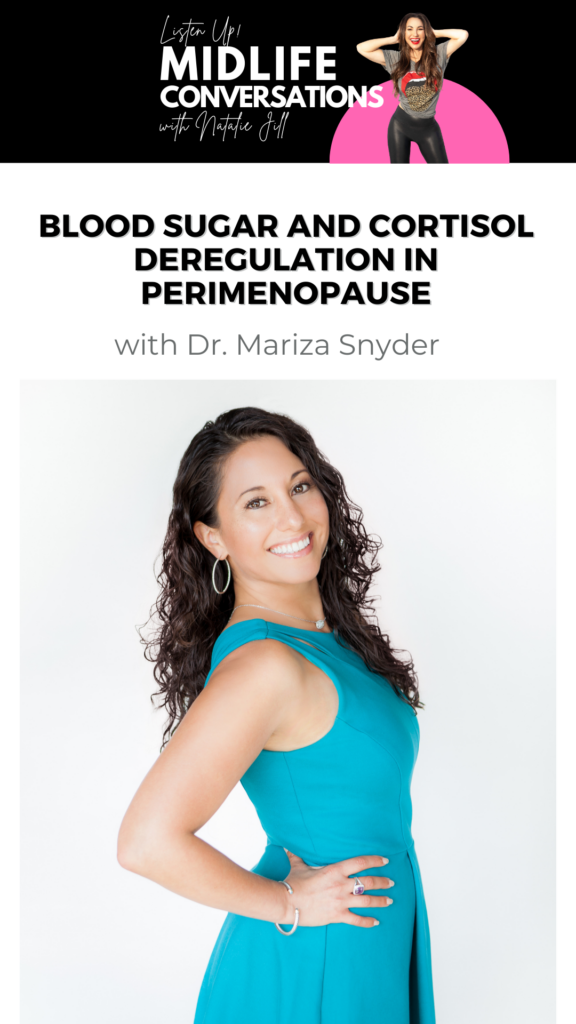15 Oct Blood Sugar and Cortisol Deregulation in Perimenopause with Dr. Mariza Snyder
Ever feel like your blood sugar is all over the place, especially during menopause? You’re not imagining it! In this episode of Midlife Conversations, I sit down with Dr. Mariza Snyder, a women’s health expert, to break down exactly why your blood sugar is fluctuating and how your hormones are playing a major role. These midlife changes are the reason I really wanted to have her on the podcast. If you’ve been feeling a little off or just curious about how to manage these changes better, this episode has the answers. Trust me, you’ll want to tune in!
What is Metabolic Syndrome?

Metabolic Syndrome is diagnosed by five metabolic biomarkers:
- Fasting blood glucose. This is your early morning fasting blood glucose. Most doctors say they want it under 100 but Dr. Mariza recommends it being under 90.
- Triglycerides. Most doctors want under 150 and Dr. Mariza wants it below 80. Once it’s at 150, it’s a massive indicator of insulin resistance.
- HDL (good cholesterol). We want this over 50.
- Blood pressure. Normal is 120/70 but diagnosis of metabolic syndrome is 130/80
- Inches around your waist. We want a woman’s to be under 35” and a man’s under 40”
If you have 3 of these 5 markers out of range, you would be diagnosed with metabolic syndrome.
Metabolic syndrome creates cellular dysfunction and inflammation in the body. When our mitochondria get below 50% capacity, we see these biomarkers go out of range. And when this happens, it sends us on the trajectory for dementia, cardiovascular disease, PCOS, and the list goes on and on.
What is the MOST Important Test for Insulin Resistance?
Well before your A1C goes up, or well before your fasting blood glucose is close to 100, for a decade your insulin levels are resistant. The number that tells us this trajectory is your fasting insulin.
What Are Normal Blood Sugar Ranges
In an ideal world, your levels would remain between 70-120 all day long. A spike past 140 is in a diabetic range. Your fasting blood glucose should be between 70-85. Any time you eat you will have a blood sugar response, but one and two hours after your first meal, you want it to go back down to 90-110.
How to Fix Your Blood Sugar
If you are having blood sugar numbers that are high, you can still feel empowered. You CAN fix and adjust it by making a few changes like:
- Stay away from processed foods
- Increase fiber and protein and healthy fats
- Finish eating for the day earlier
- Avoid sugars, especially when they are eaten by themselves
- Track your blood sugar with a CGM or finger prick test to get familiar with what affects your spikes
- Take blood sugar support supplements (like Blood Sugar Fixxr) – 1,000mg/day of berberine, 500mg before or up to 20 minutes after breakfast and dinner
- If you have done EVERYTHING to fix your blood sugar and are still having issues, consider cycling very very small amounts of GLP-1’s as a kickstart
Learn more in Dr. Mariza’s FREE Thriving in Perimenopause & Menopause Summit HERE
🎙️ Want to listen in on a LIVE recording of Midlife Conversations?
You can listen in, hear the episode unedited prior to launch AND stay on and ask your questions to the guest! (Don’t worry! We won’t air your questions so you can stay anonymous!) Go to Join.Midlifeconversations.com to learn more
